- Home
- Peter S. Beagle
We Never Talk About My Brother Page 20
We Never Talk About My Brother Read online
Page 20
All the same, she gave me my one great moment in sports, there in the cobblestone street, at five o’clock on a spring afternoon, with mothers already starting to call from windows about dinner and homework. When I stepped in for one last hopeless at-bat against her, she gave me a gray, snaggly grin—the only real smile anyone ever had from her—and she called in to me, “For you, boy. For brave!”
And she grooved one. It floated in chest-high, not veering, not dropping or hopping, just minding its own business, timing itself to my swing rather than the other way around. Shirley Temple couldn’t have missed it. Miss Eschenberg, who taught fourth grade, couldn’t have missed it. My seven-year-old brother couldn’t have missed it.
And for once I didn’t miss it. It vanished down the block, tearing through leaves, knocking down twigs, soaring high and far enough to clear the cemetery wall. I can’t say whether it actually did or not, or would have, because it caught fire at the top of its arc—simply burst into flames as it flew on out of sight. We never found any charred fragments, though Stewie Hauser hunted for two days, determined to prove that it hadn’t outdistanced his legendary home run. Nobody else cared, but I understood. Those things mattered then.
Mrs. Poliakov looked briefly after my shot, said “Hanh” to herself, pushed her fedora down hard on her head, and turned back toward her house. We never moved, but stood watching her, sensing perhaps that the game—or whatever it really was—might be ended, but that something was not yet complete. Just before entering her yard, she turned again to face us, waiting there in the street. Her face was dark and warning under the old hat, and not at all friendly.
“Next ugly in my yard,” she said clearly, “next nasty”—and she pointed to indicate the last flight of the Spaldeen—“same thing you, all you.” Now she waved both arms as high as she could reach, and went, “Whoooaww! All heads, all heads, like you ball. Whoooawww!”
We must all have been at least halfway home when I heard her call after us, “You come get balls! Balls, okay!” I think she was laughing, but I’ve never been sure. In any case, it took me a week to get Junius Dinkins’ nerve up, but then we went together and rescued all the abandoned Spaldeens littering her front yard. Mrs. Poliakov didn’t put in an appearance, though Junius swore that he caught a glimpse of that felt hat slipping around a corner—not her, just the hat, keeping an eye on us—which could have been true. Witches’ hats are magic too, as any eleven-year-old can tell you. Or they could have then.
BY MOONLIGHT
“By Moonlight” was written for this collection, and has an odd history, even for one of my stories. It actually began as a one-act play, set at dawn on the morning after a night of revels in the Faery court of Titania and Oberon. The first characters to speak are a couple of cleaning fairies (of course there would have to be cleaning fairies: you don’t think Titania does her own dusting, tidying, bedmaking, and cleaning up after an orgy, do you?)—named Halli and Halla.
HALLI
I hate Samhain.
HALLA
(anxiously)
Don’t let Herself hear you say that!
You know how she gets—
HALLI
I’ve never made a secret of it. Oh, it’s
all very well for them as wants to go
swanning around out there—
(gestures)
—luring farm boys and inspiring poets
and such, and coming home so grand
you can’t even talk to them for days...
but just look at what’s left for us every
time. Like the Wild Hunt had been
through here—
HALLA
(a little wistful)
Sometimes I think I’d like to go. I do,
Halli. Just for the night, just to see...
(laughs)
I don’t even know what I’d want to
see. The houses, I expect... the houses
in the moonlight. Just the way they
live..’
HALLI
Like pigs, trust me. They live like their
own pigs. Next one finds his way here,
ask him. If he’s honest, he’ll tell you.
In short order these two discover Paola, a country girl who had innocently wandered Under the Hill the previous night, had a grand time dancing with the faery folk, and then overslept. On being roused Paola is distinctly unhappy to learn that if she steps out into the morning of her own world it will be a hundred years later, with everything that made up her daily life gone forever. She then encounters Oberon and Titania, who urge her to stay (the latter with a certain edginess), and also someone identified only as The Man, who is obviously William Shakespeare. It’s The Man who finally solves Paola’s problem, by employing his own particular brand of magic—the magic of language—to send her home to her own time, and all’s well that ends well.
But I couldn’t quite make the concept work... and besides, I only found out after I’d completed my first draft that Neil Gaiman had already written the best Shakespeare/Titania story anyone’s ever likely to do, back in 1990, in his “Midsummer Night’s Dream” issue of The Sandman.
On my next attempt I radically altered the plot—no cleaning fairies, no Paola, no Shakespeare or Shakespearean magic—and turned the new version into a tale being told in a pub over pints of good English ale. But it came out generic, wearisome, distancing: an unmoving failure. Worth the try, because it forced me to look at my story in a completely different way, which is always a good thing; but otherwise useless.
Eventually it was suggested that I let the actual subject of the tale tell it himself—helped along by a touch of Alfred Noyes, and a hint of a hint of that bright boy from Warwickshire. I’m finally happy with the result.
Darlington was desperately glad to see the little fire as he came over the moor from Bramham. I can make it that far. There was less snow on the ground here to betray him with footprints, but the cold was harder because of that, and while his coat could keep the wind off yet awhile, his boot soles had worn as thin as his hopes. He had sent the horse off in a different direction more than an hour ago, but he knew his pursuers too well to imagine that the trick would deceive them for long, if at all. At very best he was buying time; which, Darlington decided, could well be considered the entire story of his life. Wrapping his arms around his own shoulders, he stumbled up the low hill toward the fire. I think I can make it that far.
It was reassuring to see that there was only one figure observing his approach. He’d not have expected to encounter any but fleeing, freezing high-tobys like himself on the moor... but he had always found the supposed brotherhood of outlaws greatly overrated: none could be trusted after sunset, and few in broad daylight. But even from such a distance the man near the fire was clearly no bandit. He was tall and white-haired—white-bearded as well—and wrapped in a cloak of intriguing design that Darlington determined was coming away with him, should they survive the night. He saw, as well, that the man’s face was curiously ageless in the feeble, wavering firelight, with a paradoxical mix of old sadness and equally profound tranquility. It made him nervous, as contradictions always did.
Showing no trepidation on his own part, the white-haired man beckoned Darlington to the fire, saying in a deep, quiet voice, “Warm yourself, good highwayman. I fear the pickings must have been slim on such a day.”
Darlington’s legs made the decision to sit before he did, and when he tried to speak, no sound at all came out of his mouth. The stranger nodded understandingly, and offered him a leathern flask plainly meant to contain brandy or schnapps; but what Darlington tasted was so astonishingly rich and alive inside him that he very nearly threw up, as though his body were trying to vomit out the whole terror of the day. When he was able, he gasped hoarsely, “Thank you. Whatever that was, thank you.”
“Nectar of the gods,” the stranger responded. “Or as close to it as either of us is ever likely to come. Rest now, and tell me what you will, or rest and b
e still. Those on your track will surely follow no further until morning, at the earliest. I will find more wood.”
Too weary to wonder about anything, Darlington promptly fell asleep, and was only wakened by the increased heat of the revived fire on his face. The stranger offered him another swallow from the flask, and the heel-end of a battered loaf of brown bread. “The last of my provender, forgive me. I was making for Wetherby, more or less, but that’s impossible now, in this cold. I may as well turn toward Ilkley—or even Harrogate, why not? Yes... perhaps Harrogate.”
He was obviously debating an important issue with himself, and Darlington was near drowsing off again; but the unnerving oddity of a man who seemed neither mad nor a beggar knowing him on sight for an outlaw prodded him fully awake against his will. He spoke warily to his benefactor therefore, saying, “Sir, if your kindness is meant but to delay me until the High Sheriff ’s men have their hands on me, I feel bound to inform you that the pistol under my coat is pointed directly at your charitable heart. Let me be hanged at Leeds Assizes next month, I will at least swing for something grander than a mail coach that turned out to carry nothing but solicitors’ accounts and begging letters from the colonies.” And he patted his breast meaningfully and smiled what he dearly hoped was his most elegantly menacing smile.
“Roger Darlington, you would be,” the stranger mused, smiling back at him. “A good Dalesman’s name—I hear it everywhere on the moors lately, though I somehow feel I’ll have forgotten it utterly by tomorrow’s dawn. Wensleydale, most likely?”
Darlington let his hand fall, the pistol being empty anyway, since the last shot over his shoulder that had killed a trooper’s horse. “Aye, born and bred in Skipton myself, but there’ve been Darlingtons in Wensleydale since the bloody Ark. But you have the advantage of me, sir.”
“Ah, my name? Elias Patterson, at your service.” The stranger offered his hand across the fire. “Reverend Elias Patterson that was, as you might say.”
Accepting the handshake, Darlington frowned in some puzzlement. “You’re a minister, then?”
Elias Patterson cocked his head slightly, as though the word were new to him. “Perhaps I am still. It’s hard to know, you understand.”
Darlington did know, having passed a fair number of entertaining evenings drinking, gambling, whoring and weeping with variously fallen clerics. “A woman, was it?” With this one, it would have to be a woman.
Again the thoughtful tilt of the head, the narrowing of the gray eyes, the least breath of a smile. “In a manner of speaking.”
“Well, it’s a good man’s failing. Not like what I do.”
He said it in his most swaggering manner, having once slipped into Lincoln’s Inn Fields, with a price already on his head, to see The Beggar’s Opera. Elias Patterson’s eyes were neither impressed nor unsympathetic. “You hold a low opinion of your chosen trade, is it?”
“I never said that.” Darlington found himself distinctly irritated with his own irritation. “But I hardly expect it to make me,” he gestured with his thumb toward the cold black sky—“welcome up there.”
“But why not? You work hard, you have so far harmed no one—you see, I know a bit of you, Mr. Darlington—and the worst that can be said is that you have a certain passion for redistributing the doubtless ill-gotten wealth of that class which can afford to ride about in coaches, whether public or privately-owned. As a former man of the cloth, I can tell you honestly that the Savior might very well approve.”
There was humor in the voice, but no mockery. Darlington had the alarming sense that the man meant exactly what he was saying. “I redistribute the wealth to myself, Reverend Patterson—Robin Hood’s a long time gone. Now and then I do toss a coin or two into the poor box or the collection plate, but that’s the end of it, believe me.” Weary as he was, he leaned forward, elbows on his knees. “What sort of a minister are you, anyway?”
Elias Patterson did not reply, being occupied with placing more fallen branches on the fire. They blazed up quickly, sputtering a little because of the snow. He leaned toward the flames himself, his eyes and voice speculative, almost dreamy. “How strange, when you think about it,” he mused in a near-whisper. “And we should think about it, you and I. A gentleman of the road and a—what?—a preacher who dares not even enter a church, for fear that the very blessed timbers might all come down on his head. Oh, we are indeed well met—one forever in flight, a poor fox, with no faithful vixen, no cubs waiting to warm and welcome him, celebrating him for losing the hounds one more time—”
“And just how would you know that, my wise Reverend Patterson?”
“—and the other in fact a hunter, a pursuer, wandering the same mazes over and over, endlessly searching for something he begins to feel he dreamed....” The voice dried to a meaningless insect drone.
Born a Dalesman, as Elias Patterson had guessed, Darlington had grown up with the silence of the moors. For him it was a sound in itself: a bleak, deeply elusive music, to be felt along the scalp, and in the soles of the feet, rather than heard with the ears. Tonight, listening intently for hoofbeats, for men’s voices calling to each other and the yelping of hounds—suddenly he could not endure the stillness a moment longer. “No matter our need, it’s clear that neither of us will be sleeping tonight,” he said. “My story is entirely as you imagine it, barring perhaps a trifle more education than most robbers on horseback, and consequently a dream of my own. A dull dream, certainly, for it involves living to retirement and then starting up a good little inn in Whitby or Wensleydale, catering quietly to the profession... oh, an extremely dull dream, believe me. I would much prefer to hear any tale told by a minister of the Gospel who fears to walk into a church.” Elias Patterson began to protest, but Darlington continued, “We haven’t got wood enough to see us through the night. As an earnest of my intent, I promise to gather what we need before you begin. If you will begin.”
They regarded each other for a long moment, during which Elias Patterson neither spoke, nor nodded, nor made any other sign to his criminal companion. Then Roger Darlington abruptly stepped away from the fire and set about collecting more branches. Elias Patterson sat motionless, staring into the darkness.
Darlington made three trips, and was sweating heavily despite the cold when he returned with the last armload. He rebuilt the fire entirely, so that it threw just as much heat but burned more slowly. “The one useful thing I learned from taking the King’s shilling. I did leave two shillings for him when I deserted, so he can’t be that annoyed with me.”
“A king’s bookkeeping is as mysterious as a woman’s.” Elias Patterson had not moved. “Thank you for the firewood.”
Darlington peered sideways at him. “There was a price attached.”
“Ah. My story. Are you certain you want to hear it? It is long, unlikely, and remarkably unedifying—shameful, even, to come from a minister’s lips. Blasphemous, too, properly regarded.”
“Better and better,” Darlington responded. “On such a night, a little blasphemy might serve as well as a hot posset or a mug of mulled ale. I hold you to your word, sir.”
Elias Patterson considered. “I suppose this would be as fitting a night as any for the tale, it being Imbolc, Bride’s Festival—or perhaps you guise her as St. Bridget in Skipton?” Darlington stared back at him uncomprehendingly. “Come, I know they honor Bride in the Dales, no matter what we priests and preachers admonish them. I have seen the Brideog corn dollies made, and caught my own parishioners setting out the strips of cloth for Bride to bless when she walks the land on Imbolc Eve. You? Never?”
Darlington shook his head, forcing an embarrassed laugh. “Not in Skipton, believe me. Never in Skipton.”
“A loss,” said Elias Patterson. “Christianity was ever the better for a good brawl with the old gods. Now in the village where I lived—actually not too far from here, a bit west—every last sheep in my flock believed in every one of them. Come Beltane night, not a deacon, not an elder, not a First
Soprano but was bound to be out till dawn, hunting till they dropped for faery gold. I was younger then, and I scolded them endlessly, shouting that it was an unholy pagan thing, and that those who trifled with such matters were placing their immortal souls in the gravest danger. Those were my very words, and every one of that lot sat mortified, when I called their names in church, and mumbled penitence, and went right on doing it, as I knew they would.” He sighed. “It all shames me dreadfully to recall, Mr. Darlington. You won’t understand, I expect.”
“Well, I was never exactly a churchgoing man,” Darlington answered him. “Be a better person if I had been, I’ve no doubt of it. But the world outside was so much more interesting. Always was.”
“I knew nothing of the world in those days,” Elias Patterson said. “I had my God, my work, my books and my cat, nor did it occur to me that these might not necessarily be sufficient for a man pledged to follow the Cross all his days. And for all my scorn of the old festivals as wicked folly, still I never left my house on Beltane, Samhain, Lughnasadh. My cat did, mind you, but not I.”
“Never hurts to be on the safe side.”
Elias Patterson looked directly into Darlington’s face, and his gray eyes were very bright in the firelight. He said, “We give them different names, those nights lit only by fire and the moon, depending on the county and the calendar, but we know what they are. They call up the world that was before the Lord came down among us; the world where good and evil were not so certain, so fixed as they are today, where the known and the unheard-of could mingle as they chose... where truth had its doubts, do you see?” He laughed harshly. “Well, all that was a bit alarming for me to deal with then, so I stayed by my own neat little fire on those nights, and neither stepped out nor let anything in. Who knows what your door may open to—or upon—on Beltane eve?”

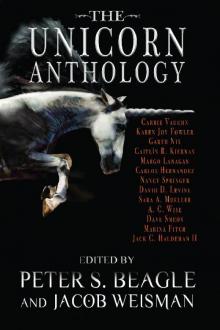 The Unicorn Anthology.indb
The Unicorn Anthology.indb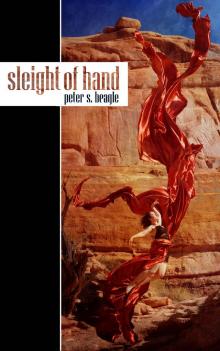 Sleight of Hand
Sleight of Hand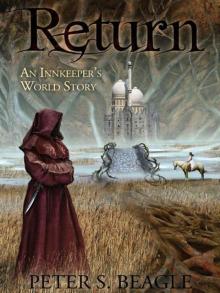 Return
Return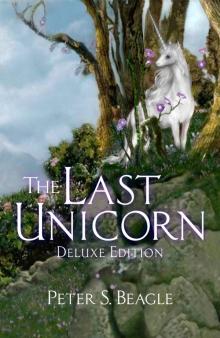 The Last Unicorn
The Last Unicorn Two Hearts
Two Hearts Mirror Kingdoms: The Best of Peter S. Beagle
Mirror Kingdoms: The Best of Peter S. Beagle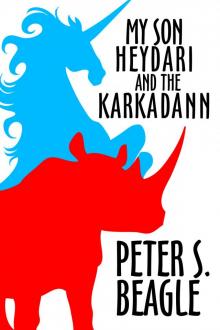 My Son Heydari and the Karkadann
My Son Heydari and the Karkadann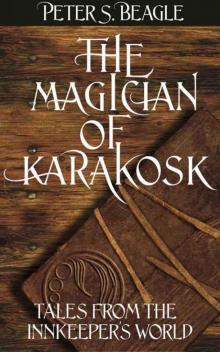 The Magician of Karakosk, and Other Stories
The Magician of Karakosk, and Other Stories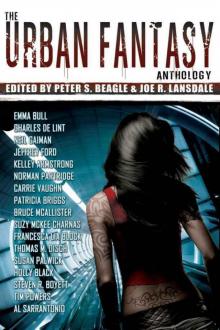 The Urban Fantasy Anthology
The Urban Fantasy Anthology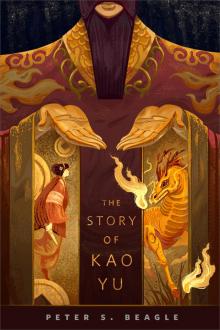 The Story of Kao Yu
The Story of Kao Yu The Karkadann Triangle
The Karkadann Triangle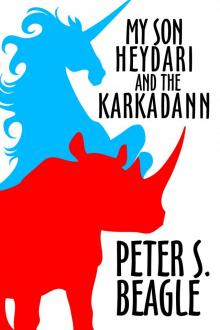 My Son and the Karkadann
My Son and the Karkadann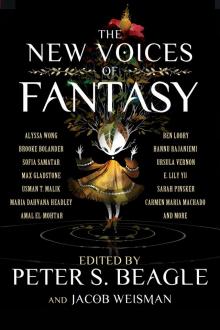 The New Voices of Fantasy
The New Voices of Fantasy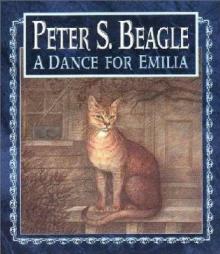 A Dance for Emilia
A Dance for Emilia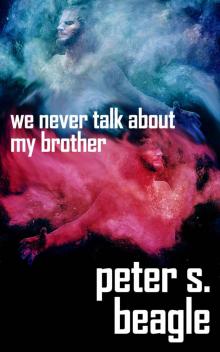 We Never Talk About My Brother
We Never Talk About My Brother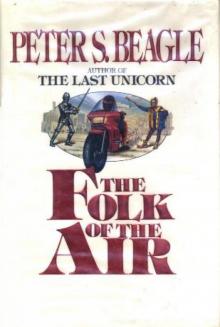 The Folk Of The Air
The Folk Of The Air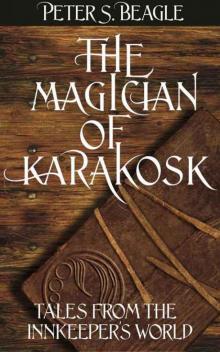 The Magician of Karakosk: Tales from the Innkeeper's World
The Magician of Karakosk: Tales from the Innkeeper's World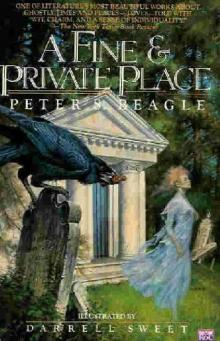 A Fine and Private Place
A Fine and Private Place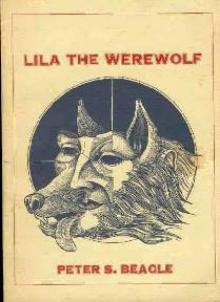 Lila The Werewolf
Lila The Werewolf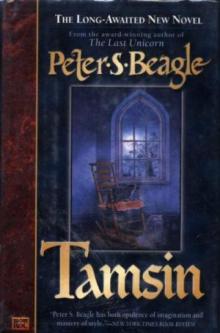 Tamsin
Tamsin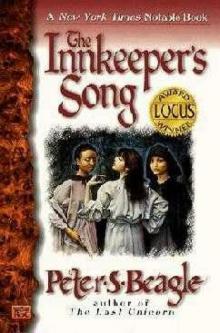 Innkeeper's Song
Innkeeper's Song